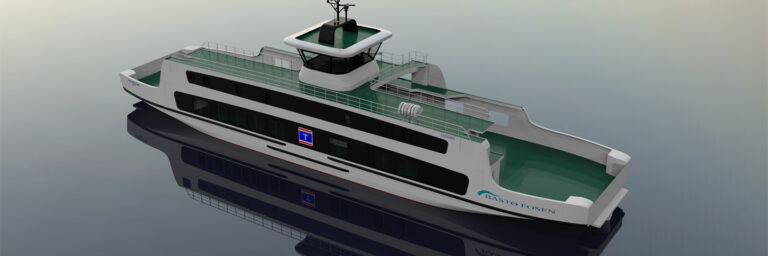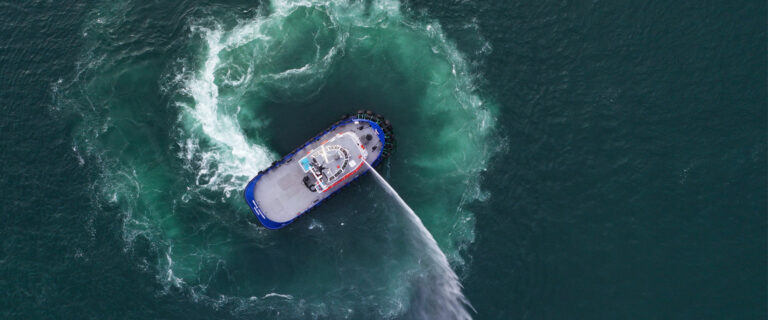Improving efficiency, reliability, and safety
The marine industry can improve the efficiency, reliability, and safety of electrical systems onboard ships, offshore platforms, and other marine structures. This is done by utilizing smart DC grids. These smart grids incorporate topologies like closed bus and ring systems, with our range of 0.35 – 6 kA, 1 kV solid-state DC breakers for protection. These advancements contribute to the ongoing evolution of marine technology towards more sustainable and efficient maritime system operations.
The future of maritime system integrations
The future of maritime system integrations and the use of onboard DC grids is characterized by several emerging trends:
Increased adoption of DC grids
There is a growing trend toward the adoption of DC grids in maritime applications due to their efficiency, reliability, and flexibility. DC grids offer advantages such as reduced energy losses, simplified integration with renewable energy sources, and improved control and monitoring capabilities.
Integration of renewable energy
With a focus on reducing emissions and increasing sustainability, maritime systems are increasingly integrating renewable energy sources. Frequently used are solar panels and wind turbines. DC grids facilitate the seamless integration of these renewable energy sources. Providing a cleaner and more sustainable power solution for ships and maritime structures.
Electrification of systems
There is a shift toward the electrification of onboard systems in maritime applications. This includes the electrification of propulsion systems, auxiliary systems, and onboard equipment. DC grids play a crucial role in enabling the efficient distribution and management of electrical power throughout the vessel.
Advancements in power electronics
As technology continues to advance, there are ongoing developments in power electronics components and systems for maritime applications. This includes the development of advanced DC-DC converters, solid-state circuit breakers, and other components to improve the efficiency, reliability, and safety of onboard DC grids.
Greater focus on energy efficiency
Energy efficiency is a key consideration in maritime operations due to fuel costs, emissions regulations, and environmental concerns. DC grids offer opportunities for optimizing energy usage, reducing fuel consumption, and minimizing environmental impact through more efficient power distribution and management.
More efficient and sustainable power solutions
Onboard maritime smart power grids
Onboard maritime smart power grids are advanced electrical distribution systems implemented on ships and maritime vessels. They integrate cutting-edge technologies for enhanced efficiency, reliability, and sustainability.
Some key aspects
Integration of smart grid technologies
Onboard maritime smart power grids incorporate smart grid technologies to optimize energy management, monitor power consumption, and improve system performance. This includes the use of sensors, communication networks, and data analytics. They gather real-time information about energy usage, equipment health, and environmental conditions.
Efficient power distribution
Smart power grids on maritime vessels leverage advanced power electronics and control systems to efficiently distribute electrical power to various onboard systems and equipment. This includes optimizing voltage levels, managing power flow, and minimizing losses to ensure the most efficient operation of the grid.
Energy storage integration
Many onboard smart power grids integrate energy storage systems, such as batteries or supercapacitors. This is done to store excess energy generated by propulsion systems or renewable energy sources. Energy storage enhances grid stability, provides backup power during emergencies, and allows for smoother integration of variable energy sources.
Renewable energy integration
Smart power grids onboard maritime vessels often incorporate renewable energy sources, such as solar panels, wind turbines, or hydrokinetic turbines, to supplement traditional fossil fuel-based propulsion systems. These renewable energy sources reduce fuel consumption, emissions, and operating costs while increasing sustainability.
Dynamic load management
Smart power grids employ dynamic load management techniques. Prioritizing and optimizing power distribution based on changing operational demands and conditions. This includes load shedding during peak demand periods, prioritizing critical systems, and balancing power distribution across different onboard systems.
Remote monitoring and control
Onboard smart power grids feature remote monitoring and control capabilities. Allowing ship operators and engineers to monitor system performance. But also diagnose faults, and remotely control equipment from shore-based or onboard control centers. This enhances situational awareness, reduces maintenance costs, and improves operational efficiency.
Cybersecurity and safety
Advantages of smart DC grids
Smart DC grids provide numerous advantages compared to traditional AC (alternating current) systems. Firstly, DC systems typically exhibit higher efficiency as they circumvent the energy losses incurred during AC-DC conversion. Moreover, many renewable energy sources, such as solar panels and wind turbines, inherently generate DC electricity. Consequently, employing a DC grid enables seamless integration of these sources without requiring supplementary conversion equipment.
Additionally, DC grids offer superior control and monitoring capabilities, particularly in setups featuring multiple power sources and loads. Furthermore, DC components tend to be more compact and lightweight than their AC equivalents, rendering them well-suited for application in space-restricted marine environments.
Closed bus and ring systems
Excellent circuit protection with DC breakers
In traditional AC grids, circuit protection is often provided by fuses or circuit breakers. However, in smart DC grids, solid-state DC breakers are increasingly being used for protection purposes. Solid-state DC breakers have several advantages over traditional fuses and mechanical circuit breakers.
Solid-state DC breakers offer a notable advantage in their ability to swiftly interrupt short-circuit currents within microseconds, a considerable improvement over the slower response times of mechanical circuit breakers or fuses, which typically act in milliseconds. This rapid reaction plays a pivotal role in mitigating equipment damage and diminishing the likelihood of electrical fires.
Moreover, the remote controllability and monitoring capabilities of solid-state DC breakers facilitate finer and more effective supervision of the electrical system, enhancing its precision and efficiency.
Overall, the adoption of novel DC power and DC grid solutions in maritime applications represents a shift toward more efficient, flexible, and sustainable power distribution solutions. Driven by advancements in technology and the increasing focus on environmental sustainability in the maritime industry. Smart DC grids enhance marine electrical systems by utilizing closed bus and ring topologies and solid-state DC breakers. They improve efficiency, reliability, and safety, integrating renewable energy and offering simplified control.




